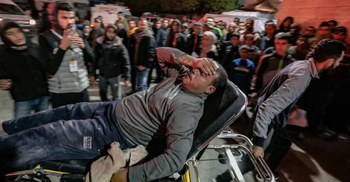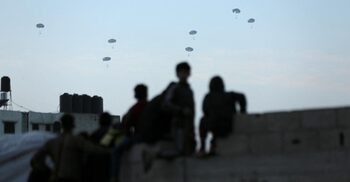Hamas delegation arrives for Gaza ceasefire talks in Cairo

A Hamas delegation has arrived in Cairo for talks on efforts to broker a ceasefire in the war in Gaza after indications that Israel has provisionally accepted a six-week phased hostage and truce deal before the beginning of the Muslim holy month of Ramadan.
Qatari and US mediators also arrived in the Egyptian capital on Sunday, according to the state-linked Al Qahera News.
Talks involving Israeli negotiators took place in the Qatari city of Doha on Saturday and Hamas is expected to respond on Sunday or Monday as time runs out before the unofficial deadline of 10 or 11 March, when Ramadan starts. The month of fasting is often accompanied by an uptick in violence in the Israeli-Palestinian conflict, even in quieter years.
A Hamas official told Agence France-Presse that if Israel were to meet its demands – which include a complete military withdrawal from the Gaza Strip and stepped-up humanitarian aid – this would “pave the way for an agreement within the next 24-48 hours”.
Another unnamed Palestinian official told Reuters, however, that a ceasefire deal was still not imminent, saying: “We’re not there yet.”
A US official said on Saturday that Israel had “more or less accepted” a deal presented by mediators.
Stemming the bloodshed in Gaza has been a difficult diplomatic task in the nearly five-month-old war sparked by Hamas’s attack on Israel in which, according to Israeli figures, about 1,200 people were killed and another 250 abducted.
Israel’s retaliatory offensive has killed more than 30,000 people, displaced more than 85% of the 2.3 million-strong population from their homes and left more than half of the strip’s infrastructure in ruins, according to data from Gaza’s health ministry and the UN.
Increasing the flow of aid is crucial. The local health ministry said on Sunday that 15 children had died from malnutrition and dehydration at Kamal Adwan hospital in Beit Lahiya, and the UN has said about a quarter of the total population is “one step away from famine”.
Hamas has indicated its negotiating position could be influenced by the deaths of 115 Palestinians in Gaza who were killed after Israeli troops opened fire near a crowd of people scrambling to get food from an aid convoy on Thursday.
Israel’s military said on Sunday that a preliminary review found its forces did not strike the convoy and that most Palestinians died in a crowd crush, although it acknowledged it fired at individuals who it said posed a threat to soldiers.
The military spokesperson R Adm Daniel Hagari did not give details on the alleged threat but said “an independent, professional and expert body” would do a more thorough examination that would be shared “hopefully in the coming days”.
UN officials visiting al-Shifa hospital the day after the attack said they saw many survivors with gunshot wounds, matching interviews with doctors treating the injured and witness accounts of the incident.
The scale of the looming starvation has pushed the US to start airdropping food into the besieged territory, a move criticised by aid agencies and human rights groups as expensive and ineffective.
A November truce in which about 100 hostages were freed in exchange for 240 Palestinians in Israeli jails collapsed after a week, and progress on a second deal has proved elusive.
With just a week left until Ramadan begins, desperate civilians in Gaza, the relatives of the remaining hostages and international mediators are all aware that time may be running out to broker a comprehensive ceasefire.
The latest negotiations have centred on a proposal to pause the fighting for six weeks, increase the flow of aid, and for Hamas to free the default defined category of vulnerable hostages: the sick, the wounded, elderly people and women.
The number and identity of Palestinian prisoners to be released has to date been a particular sticking point in talks since the first ceasefire collapsed at the beginning of December.
Source: The Guardian







